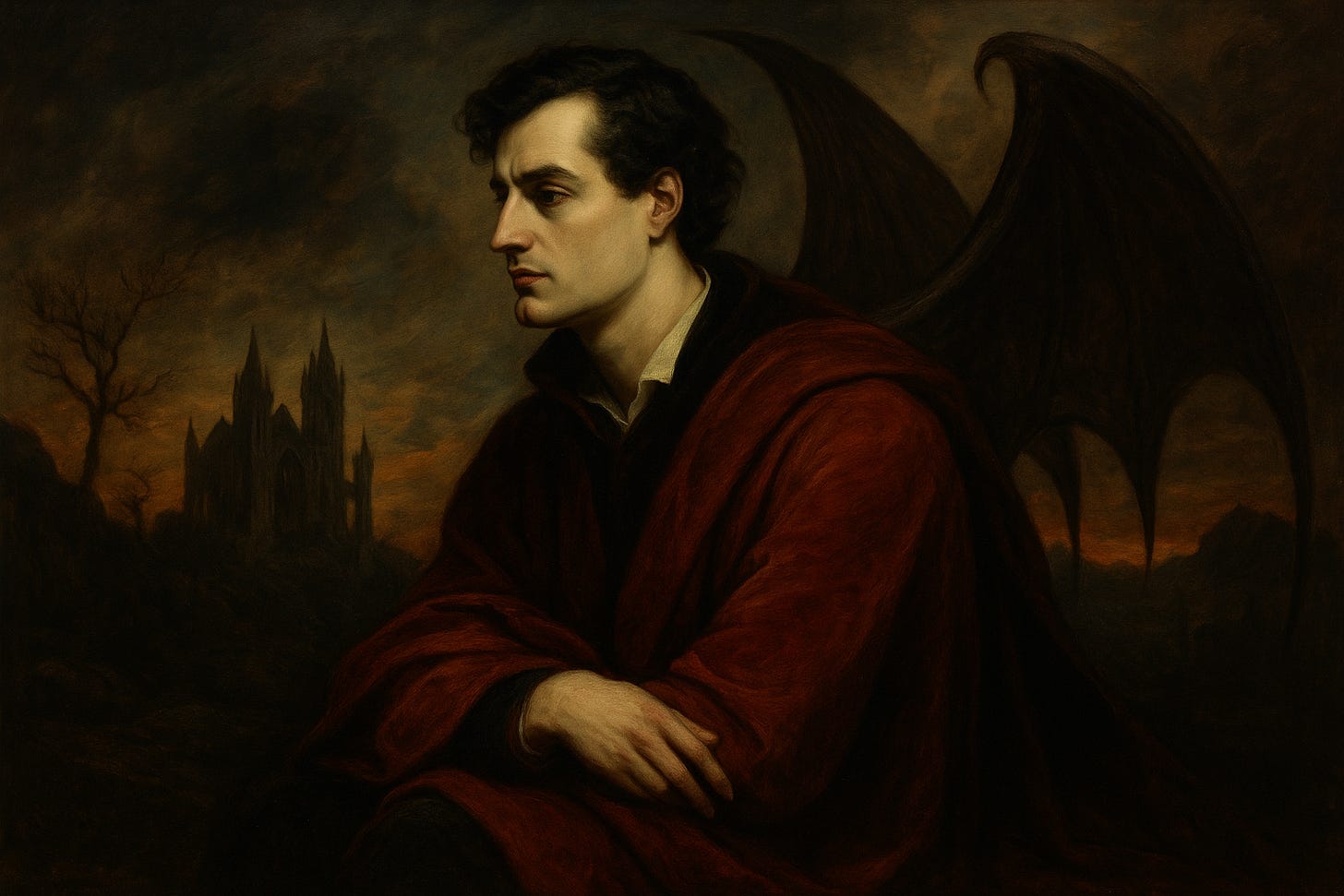Byron’s Black Mirror: Romantic Satanism and the Rothschilds
In an age of cybernetic surveillance, banking technocracies, and 5th gen psychological warfare, we need Byron more than ever.
Lord Byron wasn’t just a poet. He was a one-man rebellion against the simulation of his age — the stitched-up reality of Empire, Church, and the new banking dynasties pulling strings behind the curtain.
He played the role of Lucifer with a noble title, a scandalous figurehead for what came to be known as Romantic Satanism.
The Fallen Angel in a Smoking Jacket
Romantic Satanism isn’t about goat horns and sabbats. It’s about defiance — the refusal to bow to imposed order. In Byron’s time, that meant scorning Victorian propriety before it had even fully landed, ripping apart hypocrisy, and giving the cold shoulder to polite society.
Byron took the Miltonic Satan — the tragic, proud rebel from Paradise Lost — and ran with it. Not just on paper. In life.
He was exiled, accused of everything from incest to espionage, but he shrugged it off with a smirk. He’d ride into town, seduce your wife, scandalize the clergy, and pen a verse that could cut glass. Then he’d leave for Greece to join a war, die of fever, and become a legend.
Byron didn’t care for God. He cared for freedom of mind. He aligned with the luciferic archetype, the bringer of knowledge—not the cosmic villain, but the one who asks, “Why are we obeying these systems?”
The Poetry of Rebellion
In Cain, Byron lets Lucifer teach Cain the cosmic ropes:
“Since knowledge is denied to man, how can he / Attain it without evil?”
It’s a forbidden knowledge manifesto. Echoes of Prometheus stealing fire. Echoes of hacking the code of reality.
In Manfred, the hero conjures spirits, defies priests, and claims full ownership of his own damnation. There’s no repentance. There’s no crawling back. Manfred says:
“I have one who loved me / As I love thee.”
That "thee" isn’t God. It’s the void — the in-between. A cybernetic trance-state in the gothic Alps.
The Banking Class and Byron’s Middle Finger
Byron wasn’t just raging at the Church. He had another target: the new power class emerging from the shadows — the financiers, the proto-globalists, the Rothschilds.
In Don Juan, Canto XI, Byron takes aim:
“Who hold the balance of the world?
Who reign o’er Congress, whether royalist or liberal?
Who rouse the shirtless patriots up to hurl
Their tyrants down, and then… subsidize them?”
Translation:
Follow the money. The puppet masters aren’t kings — they’re bankers.
Byron saw the shift early. The real kings were no longer crowned — they carried ledgers, traded bonds, and backed both sides of every war. Napoleon falls? Fine. The Rothschilds profit either way.
Byron’s Legacy: The Devil in the Mirror
Byron didn’t just write about this. He lived it. He became his own dark icon. He embraced the shadow-self, knowing full well that society was a house of mirrors.
He was the prototype for the cyber-occult rebel of today. A hacker of codes — social, religious, political.
If you want to channel Byron’s energy in 2025, it’s not about ruffles and quills. It’s about:
Calling out the hidden strings — bankers, technocrats, corporate oligarchs
Rejecting imposed reality constructs — whether religious or secular
Becoming the sovereign of your own consciousness — even if it costs you everything
Byron was cancelled before cancellation was a thing. And he wore it like a badge.
Final Transmission
Romantic Satanism isn’t about devil-worship. It’s about refusing to be a pet of the system. Byron was the first post-human antihero of modernity — flesh and blood, poetry and shadow.
In an age of cybernetic surveillance, banking technocracies, and 5th gen psychological warfare, maybe we need Byron more than ever.
Not as a literary relic. But as a live virus in the cultural code.
[DOKTOR SNAKE // EDGE FILE // END TRANSMISSION]



Really enjoyed this read! I’m semi-obsessed with his Caine work, as well as interested in his life.
Almost like when you say "you are the glitch "; Byron used said "glitch reality"and weaponized it against the machine....a bit of a prototype code (Spirit) for what became the download that inspired Rage Against the Machine.